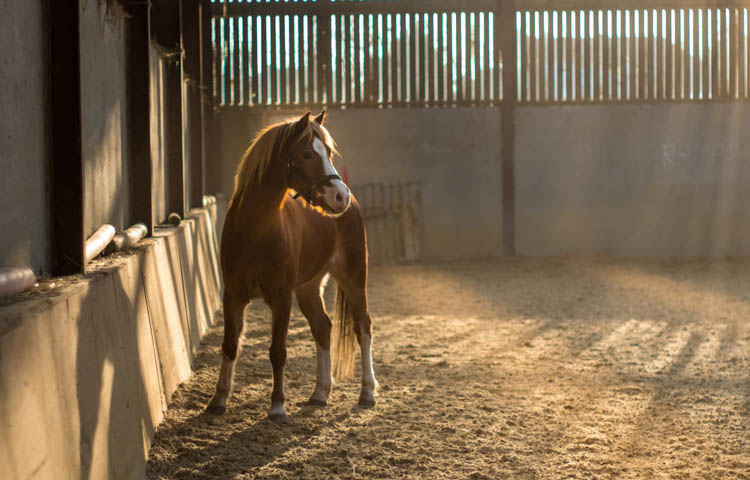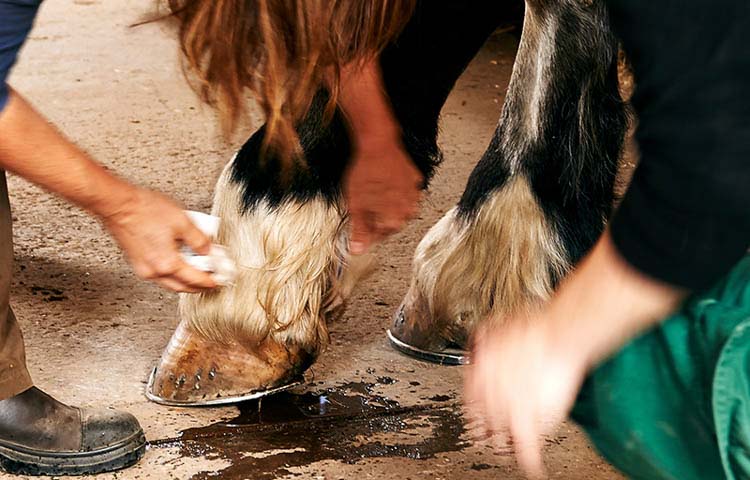How to buy a horse: a step-by-step guide
Ready to buy a horse? Learn the costs, care tips, and steps to find your perfect equine partner.
Read more18 September 2024
Most horses are very resilient animals, yet like all animals, they are subject to their own set of illnesses. They are susceptible to a number of common horse health problems and issues ranging from illness and disease, to injuries. Many horse health problems can be avoided with a regular, ongoing schedule of hoof care and watchful attention.
Colic means belly pain and is actually a catchall name for several different serious digestive problems that commonly afflict horses. These can range from minor pain to very severe and is the most common death among horses.
You must deal with suspected colic immediately, as all forms can be fatal and if reoccurring can cause serious damage to the intestinal tract and possibly twist or tear the intestines.
The condition can be caused by a blockage of the intestines (caused by improper food, foreign objects, or other factors), excessive gas in the intestines (usually caused by a rapid change in diet), or the intestines becoming twisted. Colic can also be caused by some gastrointestinal parasites.
Mild symptoms include:
As soon as any of these symptoms are noticed, a veterinarian should be contacted immediately. Try walking your horse to activate the intestines and help him pass gas or move the blockage.
To prevent colic, worm your horse regularly, try to minimise their ingestion of sand by providing a feeder that keeps the feed off the ground, and feed bran mash or beet pulp regularly to help clear the system of sand. If the horse has already had colic, they’re a bigger chance of getting it again, therefore you may have to adjust their food to make it easier to pass by wetting it or feeding it bran or pulp.
Preventative measures also includes:
Is the commonly used term for the medical condition known as recurrent airway obstruction. This respiratory inflammation is frequently caused by an allergic reaction to airborne particles. Most often seen in horses who are in their stable a lot and exposed to dust and moulds from the old hay and straw.

Is the inflammation of certain internal structures of the hoof sometimes caused by overeating grain, too much lush grass, or not getting enough exercise. Laminitis can be excruciating for the horse to put weight on the affected hoof, this painful and serious condition can lead to lameness and can be caused by whole-body stress (trauma) and eating too much grain.
If these symptoms are showing, immediately call the vet; remove grain from the feeder; hose the horse’s legs down with cold water; and confine the horse to a small stall so they cannot move around too much. Other ways to prevent laminitis are:
Horses spend so much time on their feet that it is highly likely they will have some injuries or problems with their hooves. Check for sprung or shifted shoes, cracks, strange smells, or any other abnormalities after each time you ride them.

Due to spending most of their time outside, horses are exposed to a wide range of parasites including ticks, lice, pinworms, tapeworms, roundworms, and lungworms.
Internal parasites can be controlled through regular deworming as recommended by your equine vet, as well as reducing their exposure to the source by removing manure from paddocks and stalls frequently.
If your horse is constantly rubbing its skin on objects and losing hair, they likely have an external parasite. Comb out their mane and tail, give them a thorough bath and maintain a regular deworming routine.
All horses carry intestinal worms, so they need to be given a de-wormer on a regular basis. The interval varies depending on the climate and the prevalence of worms where the horse is located. In wetter areas, worming should be done every month; whereas in a desert climate, it may only need to be done every three months. You can also reduce worms by keeping stalls clean and keeping manure away from where horses are eating.
Horses are large animals that spend most of their time on their feet. This makes them prone to leg and feet problems, and often times, abnormal gait problems. When riding horses, they can get bruised and lose hair, and may even develop “saddle sores” from an ill-fitting saddle. Therefore it is imperative that you develop good horse riding skills, and ride with proper equipment that is suited to your horse. Horses are quite sociable and will thrive when kept with other horses, so a happier and healthier horse will be kept around other horses.
To make your horse as healthy as can be, provide regular horse care that includes:
For any information about equine insurance, click here or call us at 1300 731 324